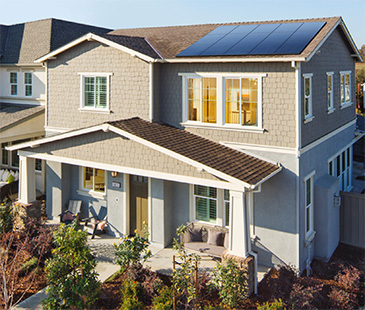Residential Solar Information
Frequently Asked Questions About Home Solar
How do home solar systems work?
A photovoltaic (PV) solar energy system is composed of solar panels, racking for mounting the panels on the roof, electrical wiring, and an inverter. From sunrise to sunset, the solar panels generate direct current electricity (DC) which is sent to the inverter. The inverter converts the DC into alternating current (AC), the type of electricity required for household use. (SunPower also offers AC solar panels which do not require a central inverter because they feature a microinverter that's factory integrated into each panel.) The AC power is delivered directly to your home's main electrical service panel for use by you and your family.
Learn how solar panels turn sunlight into energy, in addition to more information about solar inverters and a simple explanation about how net metering works.
How does shade affect a solar system's performance?
It's important to minimize shading because solar panels operate at optimal output when their entire surface is fully exposed to direct sunlight. The system will still produce energy if it is shaded but its output will lessen. SunPower will evaluate your particular situation and provide solar options for you. You can also read whether your home is a good candidate for solar to help when making the decision whether going solar is right for you.
How long will a solar system last?
Our systems are designed to have a useful life of 40 years or more.*"SunPower Module 40-Year Useful Life," SunPower white paper. 2013. Useful life is 99 out of 100 panels. For more information about solar panel durability and performance, check out this report on solar system useful life field tests performed on SunPower® systems vs. conventional panels.
How much will I save with a solar system?
Your current monthly energy use and the size of your system will determine your actual savings amount. And with little or no startup costs*For qualified customers., systems can start paying for themselves immediately. Savings will vary based on several factors, including system size, performance, your household's average energy usage as well as any applicable solar credits, tax incentives, and current solar energy buyback (net metering) rates offered by your utility company. A detailed calculation of your potential return on investment (ROI) will be provided by SunPower during your solar evaluation. Get more information about what goes into calculating home solar panel system costs and other important solar energy questions to ask your installer.
Will a home solar system increase my property taxes?
Having a solar system typically adds value to your home.*Hoen, B., Adomatis, S. Jackson, T., Graff-Zivin, J., Thayer, M., Klise, G., & Wiser, R. (2015). Selling Into the Sun: Price Premium Analysis of a Multi-State Dataset of Solar Homes. Based on analysis of home sales with & without solar energy systems in CA, CT, FL, MA, MD, NC, NY and PA from 1999 to 2013. Actual impact on home values will vary. Depending on where you live, there is often no increase in your property taxes.
How much will a SunPower solar system for my home cost?
SunPower has a wide variety of financing options, including some that don't require you to pay any upfront costs if you qualify. The cost of your solar system depends on several factors, including your current energy usage, your available amount of unshaded roof space, your local utility's net metering policy, and other factors. Learn more about how to calculate solar costs and how many solar panels you may need to power your home.
Are SunPower solar panels better?
Despite the generalities you may hear in solar advertising, not all solar systems are created equal! Of all the solar panels on the market, SunPower provides access to panels that have the highest efficiency*Highest of over 3,200 silicon solar panels, Photon Module Survey, Feb 2014. and convert the highest amount of sunlight into electricity. This means our solar panels generate more power than conventional panels within the same amount of space, and you'll need fewer panels to produce the energy you need. You can maximize your available roof space to choose the best, unobstructed location for electricity production. Our world-record panel efficiency*Green, M.A., et. al. "Solar Cell Efficiency Tables (version 48)," Progress in Photovoltaics, 2016. means you'll save more money over time by choosing SunPower panels.

